虚拟语气语法总结
(完整版)英语虚拟语气语法归纳总结
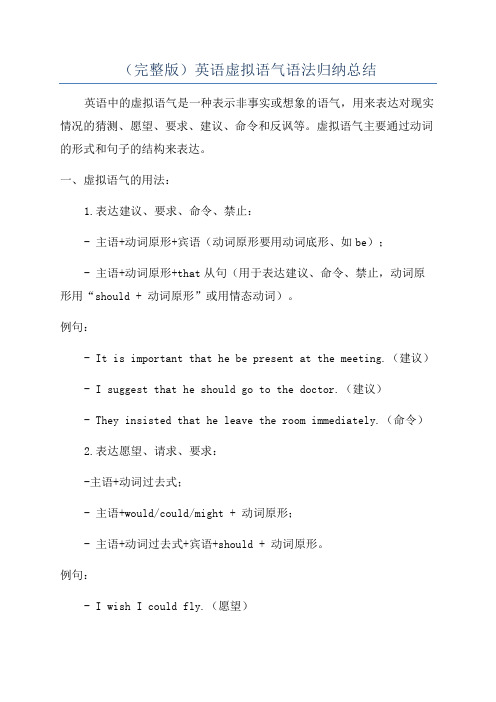
(完整版)英语虚拟语气语法归纳总结英语中的虚拟语气是一种表示非事实或想象的语气,用来表达对现实情况的猜测、愿望、要求、建议、命令和反讽等。
虚拟语气主要通过动词的形式和句子的结构来表达。
一、虚拟语气的用法:1.表达建议、要求、命令、禁止:- 主语+动词原形+宾语(动词原形要用动词底形、如be);- 主语+动词原形+that从句(用于表达建议、命令、禁止,动词原形用“should + 动词原形”或用情态动词)。
例句:- It is important that he be present at the meeting.(建议)- I suggest that he should go to the doctor.(建议)- They insisted that he leave the room immediately.(命令)2.表达愿望、请求、要求:-主语+动词过去式;- 主语+would/could/might + 动词原形;- 主语+动词过去式+宾语+should + 动词原形。
例句:- I wish I could fly.(愿望)- I would appreciate it if you could help me.(请求)3.表示虚拟条件:- If条件从句中的谓语动词用过去完成时,主句用would/should/might/could + have + 过去分词;- If条件从句中的谓语动词用过去时,主句用would/should/could + 动词原形。
例句:- If I had known his phone number, I would have called him.(虚拟条件)- If you had listened to me, we could have finished the project earlier.(虚拟条件)4.表达建议、要求、祝愿:- If only内部称述 + 主语 + 过去式。
虚拟语气的用法总结
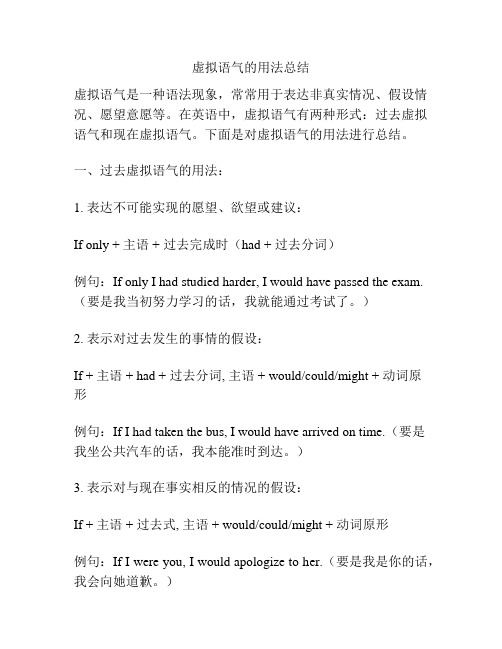
虚拟语气的用法总结虚拟语气是一种语法现象,常常用于表达非真实情况、假设情况、愿望意愿等。
在英语中,虚拟语气有两种形式:过去虚拟语气和现在虚拟语气。
下面是对虚拟语气的用法进行总结。
一、过去虚拟语气的用法:1. 表达不可能实现的愿望、欲望或建议:If only + 主语 + 过去完成时(had + 过去分词)例句:If only I had studied harder, I would have passed the exam.(要是我当初努力学习的话,我就能通过考试了。
)2. 表示对过去发生的事情的假设:If + 主语 + had + 过去分词, 主语 + would/could/might + 动词原形例句:If I had taken the bus, I would have arrived on time.(要是我坐公共汽车的话,我本能准时到达。
)3. 表示对与现在事实相反的情况的假设:If + 主语 + 过去式, 主语 + would/could/might + 动词原形例句:If I were you, I would apologize to her.(要是我是你的话,我会向她道歉。
)4. 表达对不可能实现的条件:If only + 过去式例句:If only I had a million dollars.(要是我有一百万美元该多好。
)二、现在虚拟语气的用法:1. 表达建议、命令等正式用法:表达建议:(should +动词原形/动词原形)例句:It's important (that) you should take some rest.(你应该休息一下,这很重要。
)表达命令:(应用“命令式”的虚拟形式)例句:It's vital (that) he be here on time.(他必须准时到达,这很重要。
)2. 表达愿望、要求、建议等陈述式的用法:It's time/It's high time + 过去式例句:It's time you went to bed.(你该去睡觉了,时间到了。
英语语法总结虚拟语气
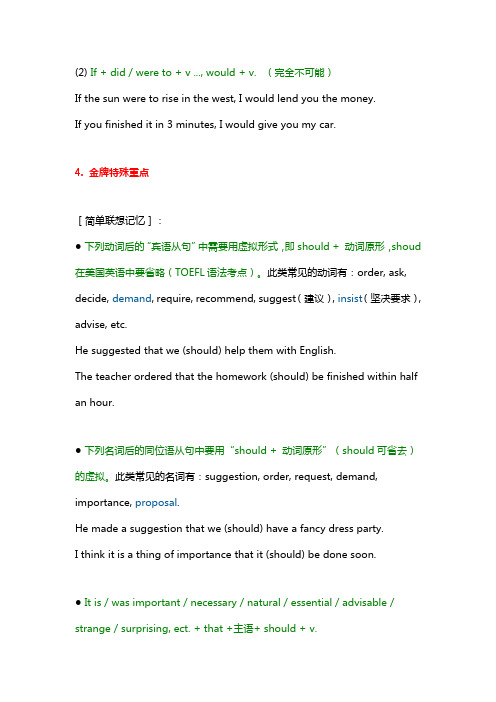
英语语法总结虚拟语气虚拟语气用来表达不可能或难以实现的愿望,与事实相反的假设,通常分为基本的三种形式。
1. 与现在事实相反的虚拟:If + did / were + ..., ... would/ should/ could/ might + do (动词原形)If I were you, I would go abroad at once. (I am not you.)If he knew it now, he could help me. (He doesn't know it now.)2. 与过去事实相反的虚拟:If + had done + ..., ... would (might) have done ...If I had known your telephone number yesterday, I would have phoned you. (I didn't know your telephone number.)If you had come here a little earlier just now, you might have met her. (You didn't come here earlier.)3. 与将来事实相反的虚拟:(1) If + should + v., ... would + v. (可能性很小)(译作“万一”)If it should rain tomorrow, you could stay at home.If I should fail, what should Ido?(2) If + did / were to + v ..., would + v. (完全不可能)If the sun were to rise in the west, I would lend you the money.If you finished it in 3 minutes, I would give you my car.4. 金牌特殊重点[简单联想记忆]:●下列动词后的“宾语从句”中需要用虚拟形式,即should + 动词原形,shoud 在美国英语中要省略(TOEFL语法考点)。
英语语法虚拟语气整理
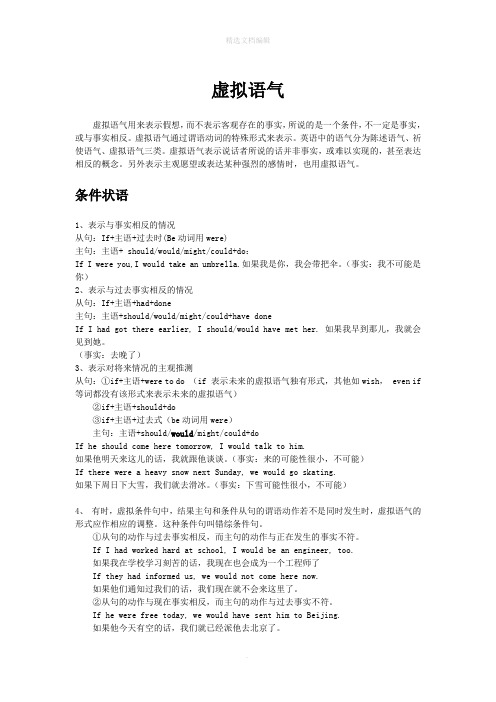
虚拟语气虚拟语气用来表示假想,而不表示客观存在的事实,所说的是一个条件,不一定是事实,或与事实相反。
虚拟语气通过谓语动词的特殊形式来表示。
英语中的语气分为陈述语气、祈使语气、虚拟语气三类。
虚拟语气表示说话者所说的话并非事实,或难以实现的,甚至表达相反的概念。
另外表示主观愿望或表达某种强烈的感情时,也用虚拟语气。
条件状语1、表示与事实相反的情况从句:If+主语+过去时(Be动词用were)主句:主语+ should/would/might/could+do:If I were you,I would take an umbrella.如果我是你,我会带把伞。
(事实:我不可能是你)2、表示与过去事实相反的情况从句:If+主语+had+done主句:主语+should/would/might/could+have doneIf I had got there earlier, I should/would have met her. 如果我早到那儿,我就会见到她。
(事实:去晚了)3、表示对将来情况的主观推测从句:①if+主语+were to do (if 表示未来的虚拟语气独有形式,其他如wish, even if 等词都没有该形式来表示未来的虚拟语气)②if+主语+should+do③if+主语+过去式(be动词用were)主句:主语+should/would/might/could+doIf he should come here tomorrow, I would talk to him.如果他明天来这儿的话,我就跟他谈谈。
(事实:来的可能性很小,不可能)If there were a heavy snow next Sunday, we would go skating.如果下周日下大雪,我们就去滑冰。
(事实:下雪可能性很小,不可能)4、有时,虚拟条件句中,结果主句和条件从句的谓语动作若不是同时发生时,虚拟语气的形式应作相应的调整。
英语虚拟语气语法总结

英语虚拟语⽓语法总结虚拟语⽓语法总结1. 虚拟条件句谓语动词的构成形式倒装结构1)Had you (=If you had) invited us, we would have come to your party. 2)Were I (=If I were) you, I would do more practice after class.3)Should it rain tomorrow, I wouldn’t go.2.虚拟条件句的特殊⽤法A. 混合虚拟条件句条件从句的动作和主句的动作不是同时发⽣.If he had followed the doctor’s advice, he would be quite all right now.(从句述说过去,主句述说现在。
)If I were you, I wouldn’thavemissed the film last night.(从句述说现在,主句述说过去。
)If I had had more self-confidence, I would become a teacher.(从句述说过去,主句述说现在。
)If the rescue team hadn’t found him, he would be dead.(从句述说过去,主句述说现在。
)If she didn’t love driving, she wouldn’t have become a driver.(从句述说现在,主句述说已发⽣。
)B. 含蓄虚拟条件句虚拟条件通过下述词语引出的短语:介词with, without, but for, if it had not been / if it were not for…etc例如:1)I couldn’t have won the competition without your encouragement.2)With your assistance (=If we had your assistance), we might finish the plan earlier3)Butfor you advice, I wouldnotbe able to do this work.4) Victor obviously doesn’t know what’s happened, otherwise he wouldn’thavemade such a stupid remark.C. 虚拟条件句中的表⽰结果的主句有时形式上可以省略,但意义上仍然存在。
虚拟语气语法总结
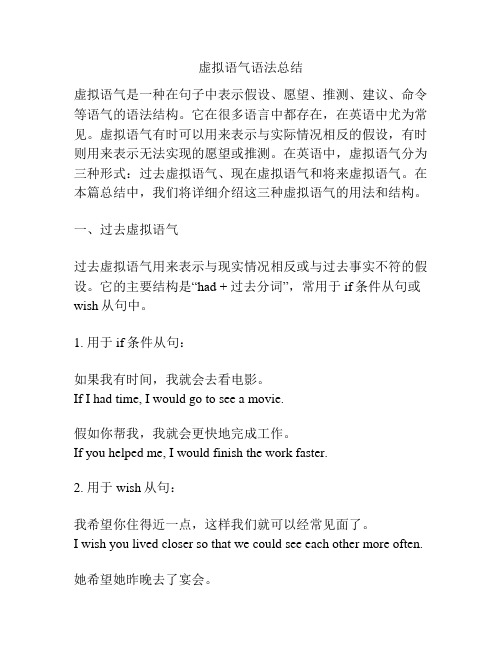
虚拟语气语法总结虚拟语气是一种在句子中表示假设、愿望、推测、建议、命令等语气的语法结构。
它在很多语言中都存在,在英语中尤为常见。
虚拟语气有时可以用来表示与实际情况相反的假设,有时则用来表示无法实现的愿望或推测。
在英语中,虚拟语气分为三种形式:过去虚拟语气、现在虚拟语气和将来虚拟语气。
在本篇总结中,我们将详细介绍这三种虚拟语气的用法和结构。
一、过去虚拟语气过去虚拟语气用来表示与现实情况相反或与过去事实不符的假设。
它的主要结构是“had + 过去分词”,常用于if条件从句或wish从句中。
1. 用于if条件从句:如果我有时间,我就会去看电影。
If I had time, I would go to see a movie.假如你帮我,我就会更快地完成工作。
If you helped me, I would finish the work faster.2. 用于wish从句:我希望你住得近一点,这样我们就可以经常见面了。
I wish you lived closer so that we could see each other more often. 她希望她昨晚去了宴会。
She wishes she had gone to the party last night.二、现在虚拟语气现在虚拟语气用来表示与现实情况相反或不太可能实现的愿望、建议、要求等。
它的主要结构是“should + 动词原形”或“were + to + 动词原形”。
1. 用于虚拟的愿望:如果我是你,我会马上辞职。
If I were you, I would quit my job immediately.(“were”表示与现实情况相反的假设)我希望你明白我的意思。
I wish you understood what I mean.(“understood”表示与现实情况不符的愿望)2. 用于虚拟的建议和要求:你应该尽早去看医生。
虚拟语气语法总结
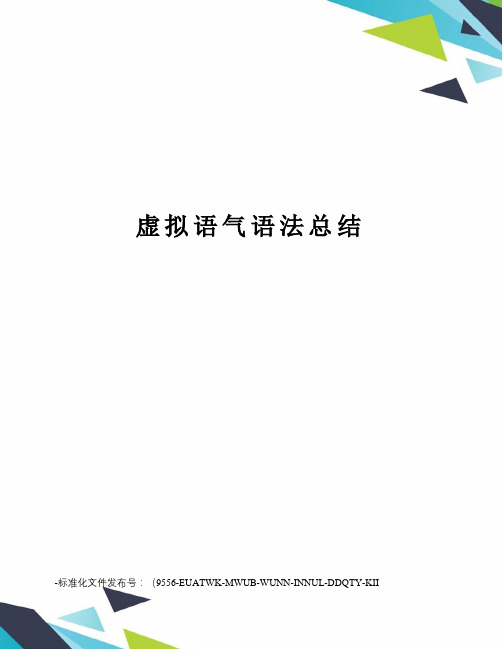
虚拟语气语法总结-标准化文件发布号:(9556-EUATWK-MWUB-WUNN-INNUL-DDQTY-KII虚拟语气在英语文法中有三种语气,即直述式语气(Indicative Mood)、祈使语气(Imperative Mood)和虚拟语气(Subjective Mood),其中前两种我们早已熟悉了,这里则不多谈了,如: How beautiful she is! 则是直述式语气,而Hurry up! Don't hurry up 则是祈使语气。
我们主要来看看虚拟语气的主要用法。
虚拟语气主要是用来表达一种无法实现的愿望,一种与事实相反的情况,或者将不可能实现的,或可能性很小的事实,假想为事实予以表述。
这样的动词结构称为虚拟语气。
它主要有三种形式,即与现在事实相反的假设,与过去事实相反的假设,与将来事实相反的假设。
它们具体结构如表8-7。
虚拟语气的构成虚拟语气其他习惯用法简表1 语法辨析Incorrect: If I was a girl, I would marry youCorrect: If I were a girl, I would marry you表示与现在事实相反的虚拟语气时,if条件句中的be动词一律用were,这句话应译为我要是个女孩,我就嫁给你。
实际上不可能是个女孩。
Incorrect: If I were you I will not worryCorrect: If I were you I shouldn't worry现在时的虚拟语气主句要用should 或would 加动词原形,这句话应译为我要是你的话,就没有必要烦恼。
要注意这种语态用在这里实际上是想把要讲出的观点表达得婉转些,有礼貌些。
Incorrect: God forgives you!Correct: God forgive you!这里的主语 God 是第三人称单数,之所以动词不加 s 是因为要表达一种祝愿,即人力所不能及的事情,实际上是 forgive前有一助动词should, May 等,但在口语中将其省略了。
英语《虚拟语气》语法知识总结归纳
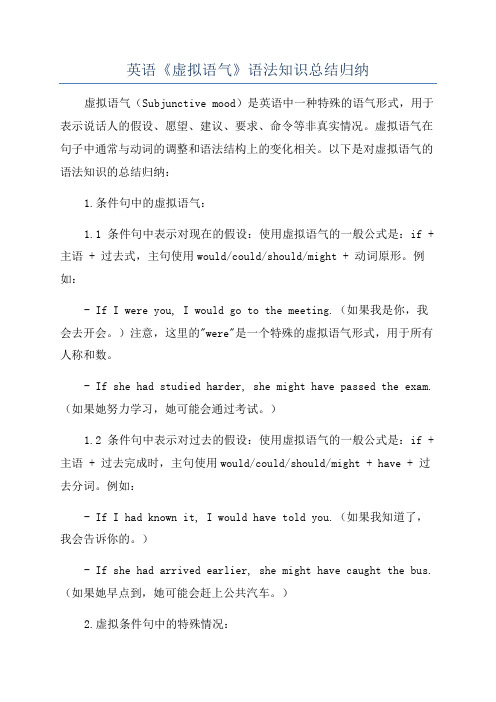
英语《虚拟语气》语法知识总结归纳虚拟语气(Subjunctive mood)是英语中一种特殊的语气形式,用于表示说话人的假设、愿望、建议、要求、命令等非真实情况。
虚拟语气在句子中通常与动词的调整和语法结构上的变化相关。
以下是对虚拟语气的语法知识的总结归纳:1.条件句中的虚拟语气:1.1 条件句中表示对现在的假设:使用虚拟语气的一般公式是:if + 主语 + 过去式,主句使用would/could/should/might + 动词原形。
例如:- If I were you, I would go to the meeting.(如果我是你,我会去开会。
)注意,这里的"were"是一个特殊的虚拟语气形式,用于所有人称和数。
- If she had studied harder, she might have passed the exam.(如果她努力学习,她可能会通过考试。
)1.2 条件句中表示对过去的假设:使用虚拟语气的一般公式是:if + 主语 + 过去完成时,主句使用would/could/should/might + have + 过去分词。
例如:- If I had known it, I would have told you.(如果我知道了,我会告诉你的。
)- If she had arrived earlier, she might have caught the bus.(如果她早点到,她可能会赶上公共汽车。
)2.虚拟条件句中的特殊情况:2.1 在虚拟条件句中表示命令、建议时,主句中的动词可以使用动词原形(而不是would/could/should/might + 动词原形)。
例如:- If you have any questions, please let me know.(如果你有任何问题,请告诉我。
)- If I were you, I would take a break.(如果我是你,我会休息一下。
虚拟语气用法归纳

虚拟语气用法归纳虚拟语气是指说话者虚构的一种语言形式,用来表达说话者对现实情况的假设、猜测、愿望或条件。
虚拟语气在中文中的使用非常广泛,涉及到多种语法结构和情境。
以下是对虚拟语气用法的归纳总结。
一、表示假设的虚拟语气1. 假设条件句假设条件句是虚拟语气的常见表现形式,通过“如果……就”“要是……就”等句式来表示假设情况。
例如:“如果我有钱的话,我就去旅行。
”“要是我能回到过去,我就不会犯同样的错误了。
”在这种情况下,虚拟语气表达了说话者对假设情况的想象或假设。
2. 表示对过去情况的虚拟对于已经发生的事情,我们常常需要使用虚拟语气来表示对过去情况的假设、愿望或遗憾。
例如:“要是我当初早点知道你的困难,我会帮助你的。
”“要是我早知道这本书这么好,我早就买了。
”在这些句子中,虚拟语气用来表达对过去情况的假设和遗憾的感受。
3. 表示不太可能实现的愿望虚拟语气也在表达愿望时发挥重要作用。
例如:“但愿我能成为一名科学家!”“但愿我们之间不曾发生过误会。
”这种虚拟语气则表达了对不太可能实现的愿望或希望的渴求。
二、表示建议、命令、要求的虚拟语气1. 否定句中的建议在否定句中,我们常常使用虚拟语气来表示建议或劝告。
例如:“你不如早点休息吧。
”“他不妨多读点书。
”这些句子表示一种建议或劝告,通过虚拟语气传达说话者对于被建议者的主观想法。
2. 表示礼貌的虚拟语气在书信、邀请和请求的语境中,虚拟语气被用来表示礼貌和尊重。
例如:“如果您有空,不妨来我家做客。
”“请求您尽快给予答复。
”这些句子中的虚拟语气传达了说话者的礼貌和尊重心态。
三、表示假设、推测的虚拟语气1. 表示假设的虚拟语气有时候,虚拟语气也可以用来表示对可能的假设或推测。
例如:“他说这话,可能是有所图。
”“今天天气这么糟,可能是要下雨了。
”在这些句子中,虚拟语气表达了说话者对可能的假设或推测。
2. 表示希望的虚拟语气虚拟语气也可以用来表示对未来情况的希望或愿望。
高中英语虚拟语气语法知识总结

高中英语虚拟语气语法知识总结一、虚拟语气的定义虚拟语气是指用来表达非真实情况、建议、建议、命令等含义的一种语气。
虚拟语气有三种情况:虚拟条件句、虚拟语气与情态动词。
二、虚拟条件句1. 条件句的形式a. 如果条件从句是对现在事实的虚拟,主句使用过去式。
b. 如果条件从句是对过去事实的虚拟,主句使用过去完成时。
c. 如果条件从句是对将来可能发生的情况的虚拟,主句使用情态动词would或should。
d. 如果条件从句是对永远不可能实现的情况的虚拟,主句使用过去完成时。
2. 虚拟条件句的用法a. 与现在事实相反:If I were you, I would study harder.(如果我是你,我会更加努力研究。
)b. 与过去事实相反:If I had known, I would have helped.(如果我当时知道,我会帮忙的。
)c. 对将来可能发生的情况表示不确定性:If it rains tomorrow, I will stay at home.(如果明天下雨,我会待在家里。
)d. 对永远不可能实现的情况表示遗憾:If only I had studied harder, I would have passed the exam.(要是我努力研究了,就能通过考试了。
)三、虚拟语气与情态动词1. 情态动词can/coulda. 能够做某事:He can play the piano.(他会弹钢琴。
)2. 情态动词may/mighta. 可能:They may be at home.(他们可能在家。
)b. 建议:He may try harder.(建议他努力。
)3. 情态动词shoulda. 应该:You should take a break.(你应该休息一下。
)b. 表示可能:They should be finished by now.(他们现在可能已经完成了。
)四、总结在高中英语中,虚拟语气是一种常见的语法现象,用来表示非真实情况、建议、命令等含义。
虚拟语气语法总结
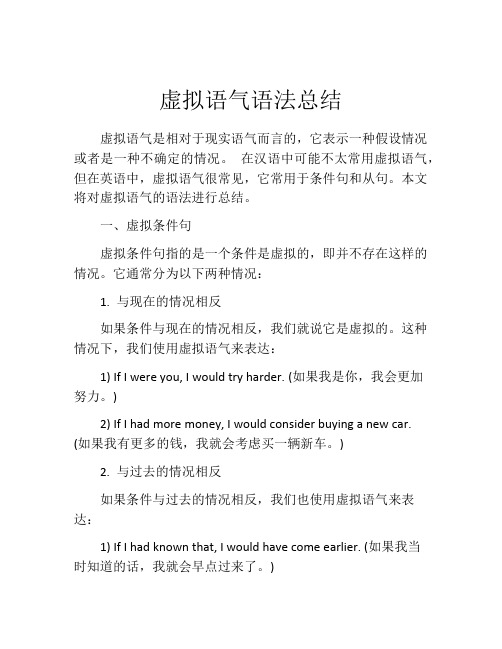
虚拟语气语法总结虚拟语气是相对于现实语气而言的,它表示一种假设情况或者是一种不确定的情况。
在汉语中可能不太常用虚拟语气,但在英语中,虚拟语气很常见,它常用于条件句和从句。
本文将对虚拟语气的语法进行总结。
一、虚拟条件句虚拟条件句指的是一个条件是虚拟的,即并不存在这样的情况。
它通常分为以下两种情况:1. 与现在的情况相反如果条件与现在的情况相反,我们就说它是虚拟的。
这种情况下,我们使用虚拟语气来表达:1) If I were you, I would try harder. (如果我是你,我会更加努力。
)2) If I had more money, I would consider buying a new car. (如果我有更多的钱,我就会考虑买一辆新车。
)2. 与过去的情况相反如果条件与过去的情况相反,我们也使用虚拟语气来表达:1) If I had known that, I would have come earlier. (如果我当时知道的话,我就会早点过来了。
)2) If I had studied harder, I would have passed the exam. (如果我当时学得更刻苦,我就能通过考试了。
)注意事项:1. 当使用“were”时,它代替的是“is”或“am”而不是“was”,这就是为什么说如果我“were”而不是如果我“was”的原因。
2. 在虚拟条件句中,“would”与“should”含义相同,用法也相同。
二、虚拟从句虚拟从句指的是一种假设性的或者不确定的情况,比如说:1. If I were to win the lottery, I would buy a new house. (如果我赢了彩票,我会买一套新房子。
)2. If it were not for you, I would never have made it. (如果不是你的话,我永远都不会成功。
虚拟语气语法总结
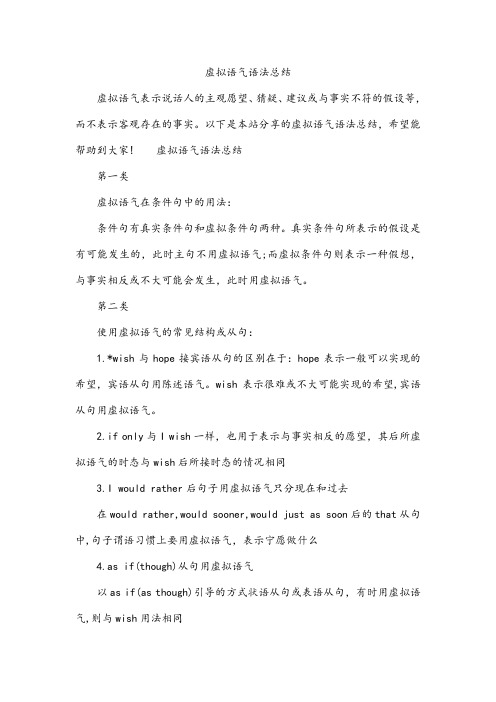
虚拟语气语法总结虚拟语气表示说话人的主观愿望、猜疑、建议或与事实不符的假设等,而不表示客观存在的事实。
以下是本站分享的虚拟语气语法总结,希望能帮助到大家! 虚拟语气语法总结第一类虚拟语气在条件句中的用法:条件句有真实条件句和虚拟条件句两种。
真实条件句所表示的假设是有可能发生的,此时主句不用虚拟语气;而虚拟条件句则表示一种假想,与事实相反或不大可能会发生,此时用虚拟语气。
第二类使用虚拟语气的常见结构或从句:1.*wish与hope接宾语从句的区别在于:hope表示一般可以实现的希望,宾语从句用陈述语气。
wish表示很难或不大可能实现的希望,宾语从句用虚拟语气。
2.if only与I wish一样,也用于表示与事实相反的愿望,其后所虚拟语气的时态与wish后所接时态的情况相同3.I would rather后句子用虚拟语气只分现在和过去在would rather,would sooner,would just as soon后的that从句中,句子谓语习惯上要用虚拟语气,表示宁愿做什么4.as if(though)从句用虚拟语气以as if(as though)引导的方式状语从句或表语从句,有时用虚拟语气,则与wish用法相同点击查看:高考英语虚拟语气怎么复习第三类从句中should+动词原形,should可省略1.在lest,for fear that(以免),incase(以防)引导的目的状语从句中的虚拟语气She walked quietly lest she (should) wakeup her roommates.她走得很轻以免吵醒她的室友。
2.表应当做值得做一类动词后的宾语从句建议advise, suggest, propose, recommend命令order, command 请求ask, demand, require, request指示direct督促urge提议move, vote希望desire坚持insist打算intend安排arrange3.order, suggestion, idea, plan, proposal, advice, demand等名词后的表语从句或同位语从句Our suggestion is that you(should)be the first to go.我们的建议是你应该第一个去。
(完整版)英语虚拟语气语法归纳总结
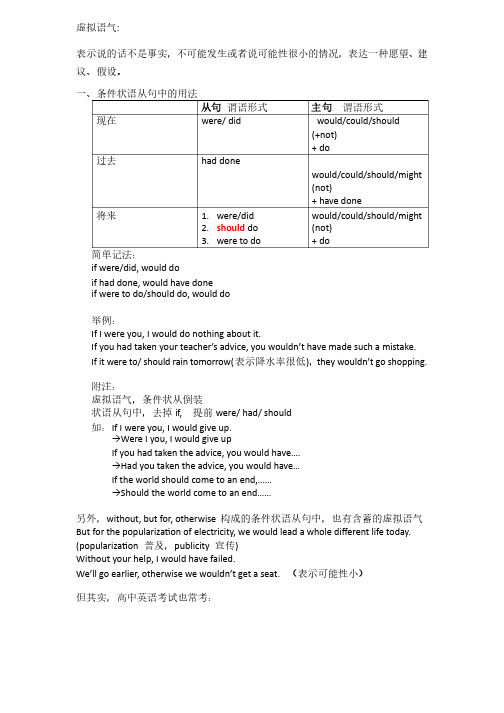
虚拟语气:表示说的话不是事实,表示说的话不是事实,不可能发生或者说可能性很小的情况,不可能发生或者说可能性很小的情况,不可能发生或者说可能性很小的情况,表达一种愿望、表达一种愿望、表达一种愿望、建建议、假设。
议、假设。
一、条件状语从句中的用法一、条件状语从句中的用法从句 谓语形式谓语形式主句 谓语形式谓语形式现在现在were/ didwould/could/should (+not) + do 过去过去 had donewould/could/should/might (not)+ have done将来将来1. were/did2. should do3. were to dowould/could/should/might (not) + do简单记法:简单记法:if were/did, would doif had done, would have done if were to do/should do, would do举例:举例:If I were you, I would do nothing about it.If you had taken your teacher’s advice, you wouldn’t have made such a mistake. If it were to/ should rain tomorrow(表示降水率很低),they wouldn’t go shopping.附注:附注:虚拟语气,条件状从倒装虚拟语气,条件状从倒装状语从句中,去掉if, 提前were/ had/ should 如:If I were you, I would give up. →Were I you, I would give upIf you had taken the advice, you would have…. →Had you taken the advice, you would have… If the world should come to an end,…… →Should the world come to an end……另外,without, but for, otherwise 构成的条件状语从句中,也有含蓄的虚拟语气构成的条件状语从句中,也有含蓄的虚拟语气 But for the populariza on of electricity, we would lead a whole different life today. (populariza on 普及,publicity 宣传) Without your help, I would have failed.We’ll go earlier, otherwise we wouldn’t get a seat. (表示可能性小)(表示可能性小)但其实,高中英语考试也常考:但其实,高中英语考试也常考:错综虚拟语气条件句错综虚拟语气条件句 即:即:假设条件状从发生的时间与所假设的谓语动词不一致,此时,主句和从句要根据各自的时间而定。
高中英语语法-虚拟语气全总结

虚拟语气用法总结大全一.虚拟语气在非真实条件句中二.虚拟语气在名词从句中1.在由suggest, demand, require, request, insist, order, command, propose等表示建议、请求、命令、愿望等动词或其同根词引出的名词从句中,名词从句虚拟句的谓语变化的形式只有一条规律——名词从句虚拟句无论其主句的谓语动词时何种形式,从句的谓语形式均为should+动词原形,其中should可以省三.虚拟语气的其他用法省一.虚拟语气在非真实条件句中1. — If the traffic hadn't been so heavy, I could have been back by 6 o'clock.—What a pity! Tina ______ here to see you. (2005 湖南)A. isB. wasC. would beD. has been2. It is hard for me to imagine what I would be doing today if I ______ in love, at the age of seven, with the Melinda Cox Library in my hometown. (2002 上海)A. wouldn't have fallenB. had not fallenC. should fallD. were to fall3. He hesitated(犹豫)for a moment before kicking the ball, otherwise he ______ a goal. (2001 上海春)A. had scoredB. scoredC. would scoreD. would have scored4. You didn't let me drive. If we _____in turn, you_____ so tired. (NMET96)A. drove; didn't getB. drove; wouldn't getC. were driving; wouldn't getD. had driven; wouldn't have got5. I didn't see your sister at the meeting. If she ______, she would have met my brother. (1994全国)A. has comeB. did comeC. cameD. had come6. -----If he__________, he __________that food.------Luckily he was sent to the hospital immediately. (MET93)A. was warned; would not takeB. had been warned; would not have takenC. would be warned; would not have takenD. would have been warned; had not taken7. If it_____ for the snow, we_____ the mountain yesterday. (MET91)A. were not; could have climbedB. were not; could climbC. had not been; could have climbedD. had not been; could climb8. Without electricity human life____ quite different today. (MET91)A. isB. will beC. would have beenD. would be11. --- Pity you missed the lecture on nuclear pollution.--- I it, but I was busy preparing for a job interview. (福建34’)A. attendedB. had attendedC. would attendD. would have attended12. I _______ through that bitter period without your generous help. ( 陕西22’)A. couldn’t have goneB. didn’t goC. wouldn’t goD. hadn’t gone13. I ______ sooner but I didn’t know that they we re waiting for me. (天津15’)A. had comeB. was comingC. would comeD. would have come14. I would have gone to visit him in the hospital had it been at all possible, but I fully occupied the whole of last week.A. wereB. had beenC. have beenD. was16. Had I known about this computer program, a huge amount time and energy .(2010浙江)A. would have been savedB. had been savedC. will be savedD. was saved17. ---- The weather has been very hot and dry.---- Yes. If it had rained even a drop, things would be much better now! And my vegetables .(2010北京)A. wouldn’t dieB. didn’t dieC. hadn’t diedD. wouldn’t have died18. If we the other road, we might have arrived here in time for the meeting. (2010湖南)A .followedB .should follow C. had followed D. would follow20. This printer is of good quality. If it _______ break down within the first year, we would repair it at our expense. (09天津15) A. would B. should C. could D. might 21. ------ Did you go to his wedding ceremony yesterday ? ------- No. But I would if I had been free. (改错) 二.虚拟语气在名词从句中1. — Where are the children? T he dinner’s going to be completely ruined.— I wish they always late. (北京28’)A. weren’tB. hadn’t beenC. wouldn’t beD. wouldn’t have been2. ______ in the regulations that you should not tell other people the password of your e-mail account. (05 上海)A. What is requiredB. What requiresC. It is requiredD. It requires3. —— Don't you think it necessary that he ______ to Miami but to New York?—— I agree, but the problem is ______ he has refused to. (2005 江苏)A. will not be sent; thatB. not be sent; thatC. should not be sent; whatD. should not send; what4.①The chairman suggested that the meeting _________________(put off) until the next week.②The look on his face suggested that he ____________(be) angry with what you did.5. Thank you for all your hard work last week. I don’t think we it without you. (08山东)A. can manageB. could have managedC. could manageD. can have managed6. The doctor recommended that you ____swim after eating a large meal.A. wouldn’tB. couldn’tC. needn’tD. shouldn’t (09浙江13)7.①The man in prison insisted that he _________nothing wrong and _________set free.A. had done, should beB. should do, should beC. had done, had beenD. should do, had b een②The patient insisted that he _________ill and _________to the hospital.A. wasn’t, wasn’t sentB. wasn’t, shouldn’t be sentC. shouldn’t be, wasn’t sentD. shouldn’t be, shouldn’t be se nt8.The workers demanded that their wages ___by 20 percent.A. raisedB. raiseC. should have been raisedD. be raised9. At the meeting everybody was against his suggestion that a new bridge ___over the river.A. be builtB. must be builtC. was to be builtD. had to be built10. It is politely requested by the hotel manager that radios ___after 11 o’clock at night.A. were not playedB. not be playedC. not to playD. did not play11. It is essential(必要的,重要的) that the books you borrowed from the library ___back before thedeadline(截止日期).A. be sentB. would be sentC. were sentD. must be sent三.虚拟语气的其他用法1. Look at the terrible situation I am in! If only I ___your advice.A. followB. had followedC. would followD. have followed2. Without the air to hold some of the sun's heat, the earth at night ______, too cold for us to live. (97 上海)A. would be freezing coldB. will be freezing coldlyC. would be frozen coldD. can freeze coldly3. It is necessary ___the dictionary immediately.A. that he will returnB. that he returnedC. that he returnD. that he has to return4. It’s already five o’clock now. Do you think it’s about time ___?A. we are going homeB. we go homeC. we went homeD. we can go home5. It ‘s high time you ___that you are not the most important person in the worldA. realizedB. have realizedC. realizeD. should be realizing6. You don’t have to be in such a hurry. I would rather you ___on business first.A. would goB. will goC. wentD. have gone7. George is going to talk about the geography of his country, but I’d rather he more on its culture.A .focus B. focused C. would focus D. had focused(2010江苏)8. I have watched that movie——it’ll give me horrible dreams.A. shouldn’tB. needn’tC. couldn’tD. mustn’t (2010山东)9. But for their help, we ___ the program in time. (09安徽34)A. can not finishB. will not finishC. had not finishedD. could not have finished10. But for the help of my English teacher, I ____ the first prize in the English Writing Competition.A. would not winB. would not have wonC. would winD. would have won (09福建35)11. What a pity? Considering his ability and experience, he better. (08江西)A. need have doneB. must have doneC. can have doneD. might have done12. If it were not for the fact that she _____ sing, I would invite her to the party. (2006 福建)A. couldn’tB. couldC. can’tD. might not13. ______ fired, your health care and other benefits would be immediately cut off.(2006 湖北)A. Would you beB. Should you beC. Could you beD. Might you be14. When a pencil is partly in a glass of water, it looks as if it ______. (1995 全国)A. breaksB. has brokenC. were brokenD. had been broken15. ______for the free tickets, I would not have gone to the films often. (1995 上海)A. If it is notB. Were it notC. Had it not beenD. If they were not16. What would have happened _________ , as far as the river bank? (NMET 2001 上海)A. Bob had walked fartherB. if Bob should walk fartherC. had Bob walked farther C. if Bob walked farther。
虚拟语气语法总结
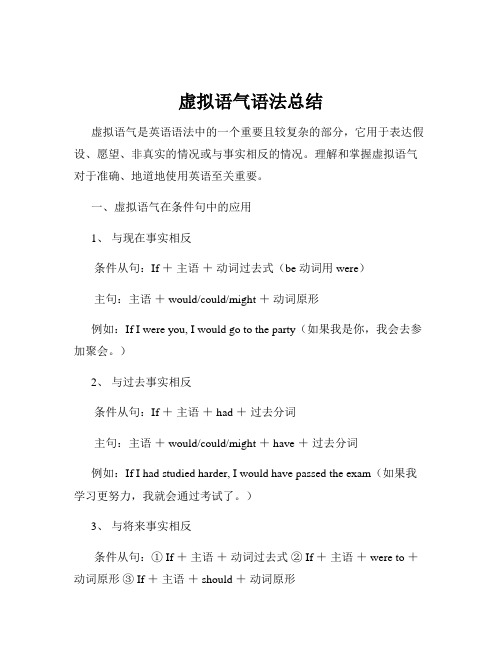
虚拟语气语法总结虚拟语气是英语语法中的一个重要且较复杂的部分,它用于表达假设、愿望、非真实的情况或与事实相反的情况。
理解和掌握虚拟语气对于准确、地道地使用英语至关重要。
一、虚拟语气在条件句中的应用1、与现在事实相反条件从句:If +主语+动词过去式(be 动词用 were)主句:主语+ would/could/might +动词原形例如:If I were you, I would go to the party(如果我是你,我会去参加聚会。
)2、与过去事实相反条件从句:If +主语+ had +过去分词主句:主语+ would/could/might + have +过去分词例如:If I had studied harder, I would have passed the exam(如果我学习更努力,我就会通过考试了。
)3、与将来事实相反条件从句:① If +主语+动词过去式② If +主语+ were to +动词原形③ If +主语+ should +动词原形主句:主语+ would/could/might +动词原形例如:If it rained tomorrow, I would stay at home (如果明天下雨,我就待在家里。
)二、虚拟语气在宾语从句中的应用1、 wish 后的宾语从句与现在事实相反:从句用一般过去时例如:I wish I were as tall as you (我希望我和你一样高。
)与过去事实相反:从句用过去完成时例如:I wish I had met you before (我希望我以前见过你。
)与将来事实相反:从句用 would/could +动词原形例如:I wish you would come tomorrow (我希望你明天能来。
)2、 would rather 后的宾语从句与现在或将来事实相反:从句用一般过去时例如:I would rather you came tomorrow (我宁愿你明天来。
英语虚拟语气语法总结
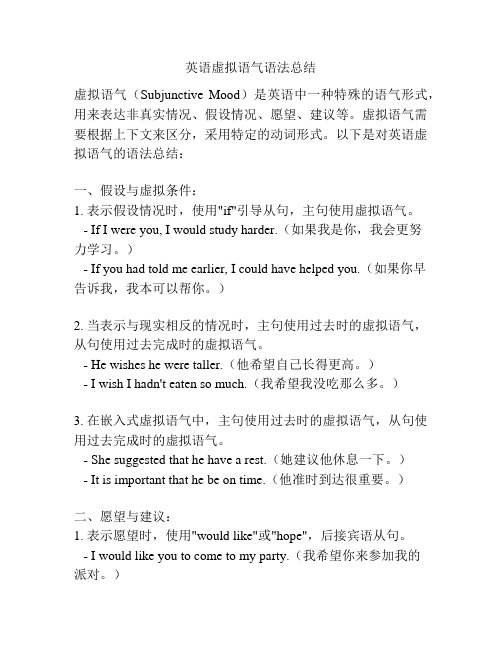
英语虚拟语气语法总结虚拟语气(Subjunctive Mood)是英语中一种特殊的语气形式,用来表达非真实情况、假设情况、愿望、建议等。
虚拟语气需要根据上下文来区分,采用特定的动词形式。
以下是对英语虚拟语气的语法总结:一、假设与虚拟条件:1. 表示假设情况时,使用"if"引导从句,主句使用虚拟语气。
- If I were you, I would study harder.(如果我是你,我会更努力学习。
)- If you had told me earlier, I could have helped you.(如果你早告诉我,我本可以帮你。
)2. 当表示与现实相反的情况时,主句使用过去时的虚拟语气,从句使用过去完成时的虚拟语气。
- He wishes he were taller.(他希望自己长得更高。
)- I wish I hadn't eaten so much.(我希望我没吃那么多。
)3. 在嵌入式虚拟语气中,主句使用过去时的虚拟语气,从句使用过去完成时的虚拟语气。
- She suggested that he have a rest.(她建议他休息一下。
)- It is important that he be on time.(他准时到达很重要。
)二、愿望与建议:1. 表示愿望时,使用"would like"或"hope",后接宾语从句。
- I would like you to come to my party.(我希望你来参加我的派对。
)- She hopes that the weather will be good tomorrow.(她希望明天天气会好。
)2. 表示建议时,使用"should"或"would rather"等,后接宾语从句。
- I suggest that you see a doctor.(我建议你去看医生。
高中英语语法-虚拟语气全总结
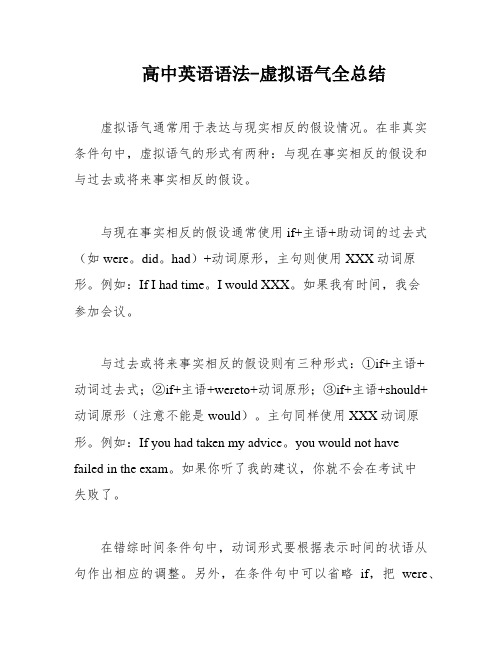
高中英语语法-虚拟语气全总结虚拟语气通常用于表达与现实相反的假设情况。
在非真实条件句中,虚拟语气的形式有两种:与现在事实相反的假设和与过去或将来事实相反的假设。
与现在事实相反的假设通常使用if+主语+助动词的过去式(如were。
did。
had)+动词原形,主句则使用XXX动词原形。
例如:If I had time。
I would XXX。
如果我有时间,我会参加会议。
与过去或将来事实相反的假设则有三种形式:①if+主语+动词过去式;②if+主语+wereto+动词原形;③if+主语+should+动词原形(注意不能是would)。
主句同样使用XXX动词原形。
例如:If you had taken my advice。
you would not have failed in the exam。
如果你听了我的建议,你就不会在考试中失败了。
在错综时间条件句中,动词形式要根据表示时间的状语从句作出相应的调整。
另外,在条件句中可以省略if,把were、had、should提到句首,变成倒装句式。
例如:Were I at school again。
I would study harder。
如果我还有上学的机会,我会更加努力研究。
Had you arrived earlier。
you would have caught the bus.If it rains tomorrow。
XXX climbing.What would you do with a n dollars?We couldn't have finished the work ahead of time without your help.Otherwise。
I would have taken part in the sports meeting.XXX me of your birthday。
or else I would have known nothing about it.A man who s drinking water would be dead in about seven days.I might have been XXX assistance。
虚拟语气语法总结笔记
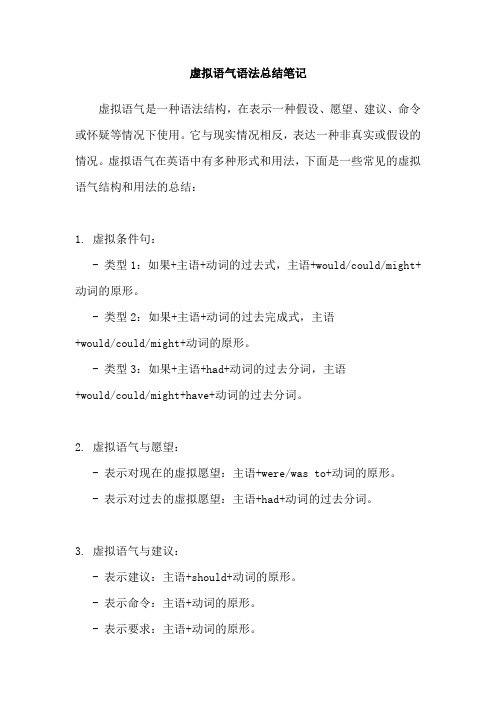
虚拟语气语法总结笔记
虚拟语气是一种语法结构,在表示一种假设、愿望、建议、命令或怀疑等情况下使用。
它与现实情况相反,表达一种非真实或假设的情况。
虚拟语气在英语中有多种形式和用法,下面是一些常见的虚拟语气结构和用法的总结:
1. 虚拟条件句:
- 类型1:如果+主语+动词的过去式,主语+would/could/might+动词的原形。
- 类型2:如果+主语+动词的过去完成式,主语
+would/could/might+动词的原形。
- 类型3:如果+主语+had+动词的过去分词,主语
+would/could/might+have+动词的过去分词。
2. 虚拟语气与愿望:
- 表示对现在的虚拟愿望:主语+were/was to+动词的原形。
- 表示对过去的虚拟愿望:主语+had+动词的过去分词。
3. 虚拟语气与建议:
- 表示建议:主语+should+动词的原形。
- 表示命令:主语+动词的原形。
- 表示要求:主语+动词的原形。
4. 虚拟语气与怀疑:
- 表示怀疑:主语+动词的过去式。
虚拟语气在英语中用于正式的书面语、虚拟条件、假设情况、愿望、建议和怀疑等方面。
需要注意的是,虚拟语气的用法在口语和书面语中可能有所不同。
使用虚拟语气时,需要注意动词的时态和语态的变化。
总而言之,掌握虚拟语气的使用可以帮助我们更好地表达假设、愿望、建议、命令或怀疑等情况,使我们的语言更加丰富和灵活。
虚拟语气用法梳理

虚拟语气用法梳理虚拟语气是指表达一种假设、愿望、建议、命令、怀疑、推测等非事实情况的语气。
在汉语中,通过词语的选择、语序的改变、虚构语气词等手段来表达虚拟语气。
在英语中,虚拟语气的表达更加规范和明确,有一套独特的语法规则和结构。
一、对过去的虚拟1. 虚拟的动词形式:- 过去式(简单过去时态)常用于表达与过去事实相反的情况,如:I wish I were taller.(我但愿我更高。
)- 过去完成时(had + 过去分词)常用于表示对过去情况的假设,如:If I had studied harder, I would have passed the exam.(如果我当时更努力学习,我就能通过考试。
)- would have + 过去分词用于对过去的事实进行猜测,如:He looks pale as if he would have seen a ghost.(他看起来苍白,好像是看到了鬼。
)2. 虚拟的连接词:- If only(要是...就好了)常用于表达遗憾的气氛,如:If only I had known the truth earlier, I wouldn't have made such a mistake.(要是我早点知道真相,就不会犯这样的错误了。
)- as if / though(好像,仿佛)常用于描述虚构或推测的情况,如:She behaves as if she were the boss.(她的行为好像她是老板。
)二、对现在的虚拟1. 虚拟的动词形式:- 一般现在时(主语+动词原形)与现在事实相反的情况,如:She speaks French as if she were a native speaker.(她说法语就好像是当地人一样。
)- should + 动词原形用于虚拟条件,如:If it should rain, the game would be canceled.(如果下雨的话,比赛将被取消。
虚拟语气语法总结
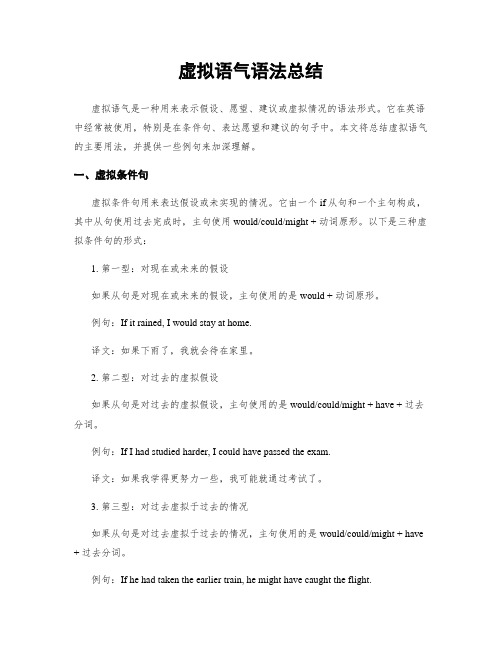
虚拟语气语法总结虚拟语气是一种用来表示假设、愿望、建议或虚拟情况的语法形式。
它在英语中经常被使用,特别是在条件句、表达愿望和建议的句子中。
本文将总结虚拟语气的主要用法,并提供一些例句来加深理解。
一、虚拟条件句虚拟条件句用来表达假设或未实现的情况。
它由一个if从句和一个主句构成,其中从句使用过去完成时,主句使用would/could/might + 动词原形。
以下是三种虚拟条件句的形式:1. 第一型:对现在或未来的假设如果从句是对现在或未来的假设,主句使用的是would + 动词原形。
例句:If it rained, I would stay at home.译文:如果下雨了,我就会待在家里。
2. 第二型:对过去的虚拟假设如果从句是对过去的虚拟假设,主句使用的是would/could/might + have + 过去分词。
例句:If I had studied harder, I could have passed the exam.译文:如果我学得更努力一些,我可能就通过考试了。
3. 第三型:对过去虚拟于过去的情况如果从句是对过去虚拟于过去的情况,主句使用的是would/could/might + have + 过去分词。
例句:If he had taken the earlier train, he might have caught the flight.译文:如果他坐了早一班火车,他可能就赶上了航班。
二、虚拟愿望虚拟愿望用来表达我们希望某件事情是真的,但实际情况并非如此。
它通常以动词过去式的形式出现,或是使用were作为动词be的过去式,不管主语是单数还是复数。
以下是几种常见的虚拟愿望的形式:1. 对现在的愿望例句:I wish I had a car.译文:我希望我有一辆车。
2. 对过去的愿望例句:I wish I had studied abroad when I had the chance.译文:我希望当时有机会时我去了国外留学。
- 1、下载文档前请自行甄别文档内容的完整性,平台不提供额外的编辑、内容补充、找答案等附加服务。
- 2、"仅部分预览"的文档,不可在线预览部分如存在完整性等问题,可反馈申请退款(可完整预览的文档不适用该条件!)。
- 3、如文档侵犯您的权益,请联系客服反馈,我们会尽快为您处理(人工客服工作时间:9:00-18:30)。
虚拟语气在英语文法中有三种语气,即直述式语气(In dicative Mood)、祈使语气(ImPeratiVe MOOd)和虚拟语气(SUbjeCtiVe MOOd),其中前两种我们早已熟悉了,这里则不多谈了,女口: HOW beautiful She is!则是直述式语气,而HUrry up! Do n't hurry UP则是祈使语气。
我们主要来看看虚拟语气的主要用法。
虚拟语气主要是用来表达一种无法实现的愿望,一种与事实相反的情况,或者将不可能实现的,或可能性很小的事实,假想为事实予以表述。
这样的动词结构称为虚拟语气。
它主要有三种形式,即与现在事实相反的假设,与过去事实相反的假设,与将来事实相反的假设。
它们具体结构如表8 —7。
虚拟语气的构成虚拟语气其他习惯用法简表1语法辨析Incorrect: If I WaS a girl, I would marry youCorrect: If I Were a girl, I would marry you表示与现在事实相反的虚拟语气时,if条件句中的be动词一律用Were,这句话应译为我要是个女孩,我就嫁给你。
实际上不可能是个女孩。
Incorrect: If I Were you I will not worryCorrect: If I Were you I should n't worry现在时的虚拟语气主句要用should或would加动词原形,这句话应译为我要是你的话,就没有必要烦恼。
要注意这种语态用在这里实际上是想把要讲出的观点表达得婉转些,有礼貌些。
In correct: God forgives you!Correct: God forgive you!这里的主语God是第三人称单数,之所以动词不加S是因为要表达一种祝愿,即人力所不能及的事情,实际上是forgive前有一助动词should, May 等,但在口语中将其省略了。
如:May you be happy祝你幸福。
In correct: If the Weather WaS nice yesterday,We would have gone to the zooCorrect: If the Weather had been nice yesterday We would have gone to the zoo因句中有 yesterday 一词即表示的是与过去相反的事实,即昨天天气很不好, 我们也未去动物园,所以if 条件句应用had+过去分词。
Incorrect: If it is was not snowing right now,I will go for a walkCorrect: If it was (were) not snowing right now , I would go for a walk虚拟语态be 动词作助动词时,则可用 WaS 来取代were,女口 WaS to 。
虚拟语 态中的动词如果是表示正在进行之中也要用进行时态。
Incorrect: If you had taken my advice, you Would have been better noWCorrect: If you had taken my advice, you Would be better noW这句话的意思是如果你以前要是能听我的忠告的话, 你现在就会好多了。
其条 件句是与过去事实相反的虚拟句, 而主句是与现在事实相反的虚拟句, 这在语法 书中叫做混合虚拟条件句。
例如: If I had caught that plane , I Would be dead noW 即: The plane I intended to catch craShed and everyone WaS killedhe Would go home at once he Would go home at once在虚拟条件句中的if 可以省略,但if 省略后其句子的结构要采用倒装语序Incorrect: SuppoSing your teacher SaW you With me What doeS She think?Correct: SuppoSing your teacher SaW you With me , What might She think?这句话中没有if 条件句,但仍要用作虚拟语态。
这里因为有些分词或介词短 语,起到了从句的作用。
这些短语有: Without , providing, SuppoSing , butfor(you) …Incorrect: To See the girl , you Will like her Correct: To See the gir ,l you Would like her这里的条件句是用不定式取代了。
Incorrect: I'm Sorry I did have come here by car Correct: I'm Sorry I Should have come here bycar 这里的条件句被省略了, 其意为我真应该坐小车来。
同样在句意不会混淆的情 况下,主句也有时可以被省略,女口: What if We shouldfail!(我们万一失败了如何)。
If he could do it, Why not? (如果他能做,他怎么会不干呢 ?)Incorrect: If the earth Were (WaS) to turn from eaSt to WeS ,t I Will give you thiS car aS a giftCorrect: If the earth Were(WaS) to turn from eaSt to WeSt I Would give you thiS car aS a gift条件句中也常用 Were to 来表示说话者认为可能性极小或根本不可能的事。
In correct: If you'd have told him early, he would have PaSSed the examIncorrect: He Were you , he Would go home at onceCorrect: Were he you , Correct: If he Were you ,Correct: If you had told him early, he would have PaSSed the exam非正式口语中往往听见外国人讲:'d have÷ PP (过去分词)但仍没有人认为它是正确的句子,不易为我们效仿。
In correct: The little girl looked as if She would have See na ghost Correct: The little girl looked as if She had See n a ghost要注意的是as if从句中如果用虚拟语气,它的用法要与if条件句的动词结构相同,即与现在事实相反动词用过去式,be动词用were,而与过去事实相反的动词用had+ PP (过去分词)。
另外更要注意的是,并非所有 as if从句都要用虚拟语气。
如:Itlooks as if it is going to Snow (看天好像要下雪)即是真实条件句。
In correct: I should have come here early but I had bee nbusyCorrect: I should have come here early but I WaSbUSybut是转折连词,其后的句子是真实句,而不是虚拟句。
In correct: To tell the truth, I WiSh I know her address nowCorrect: To tell the truth, I WiSh I knew heraddress nowWiSh的宾语从句中要用虚拟结构,与现在事实相反的条件动词要用过去式,be动词用were,与过去事实相反的条件动词要用hac÷过去分词。
女口: I WiShed I had PaSSed that examIn correct: HiS homework WaS Writte n badlyI WiSh he will do it better tomorrowCorrect: HiS homework WaS Writte n badlyI WiSh he would do it better tomorrowWiSh要用来表示对现状不满,希望将来有所改进,则要用would加动词原形。
并非WiSh不能表达真正的祝愿,但是不能接从句,而要用双宾语,或不定式,如:I WiSh you luck (双宾语)I WiSh you to be a good StUde ntI WiSh to See her at onceIn correct: I WiSh it will not be ano ther failureCorrect: I hope it will not be ano ther failureCorrect: I WiSh it would n ot be ano ther failure要注意hope与WiSh的不同用法。
2例题解析[例1] If he __ on tourists for his bus in ess he would have to close his shopA dependsB will dependC depended DhaS depended[答案]C. 这是与现在事实相反的假设。
应译为:如果他仅靠旅游来做生意的话,他早就要关门了。
[例2] Had She been younge, Sh ____ more beautifulA had beenB might have beenC might beD would be[答案]B. 因其条件句是省去if的与过去事实相反的假设。
[例3] If you __ that TV play last ni ght, you would n't be SIeePyA have n't WatChedB did n't WatChC had n't WatChedD would n't have WatChed[答案]C. 因是与过去事实相反的假设。
